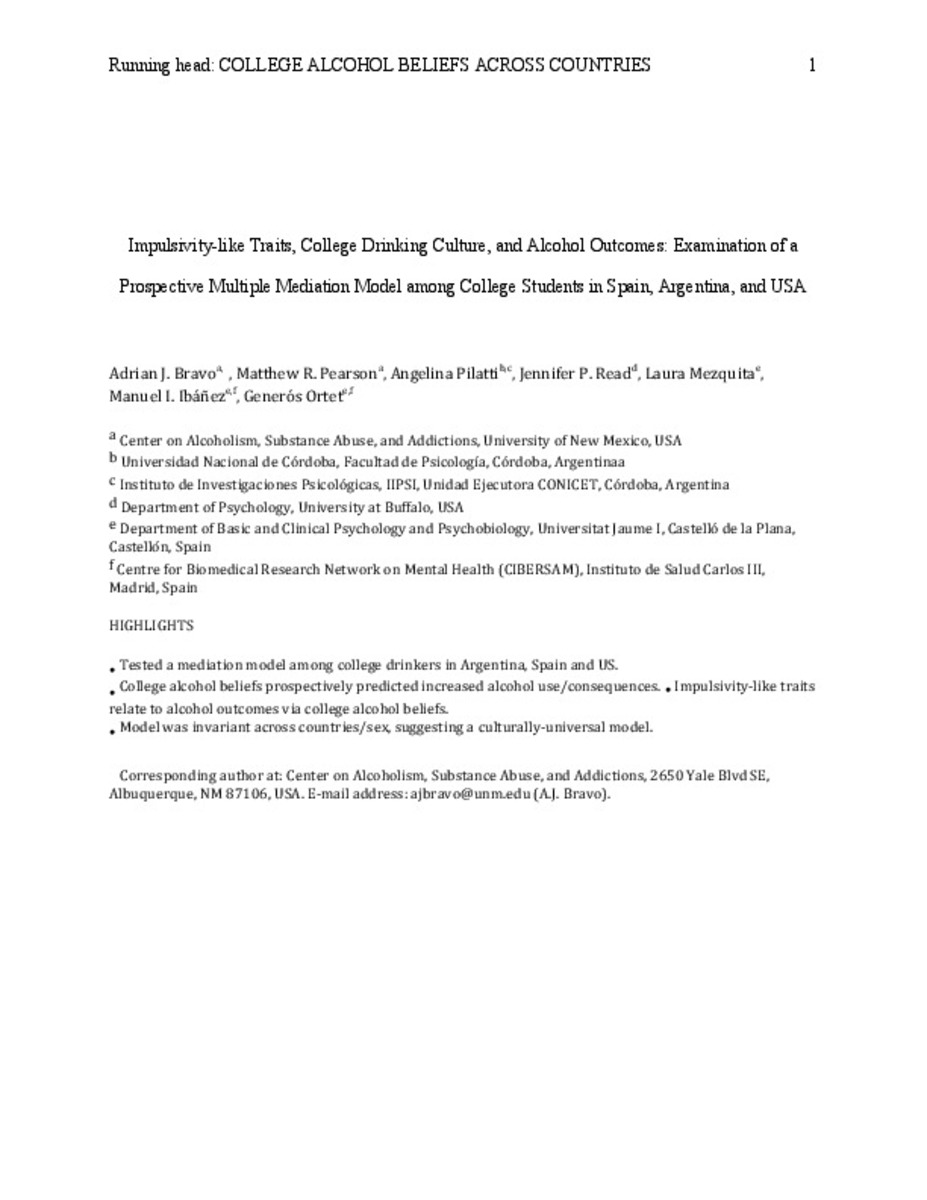Mostrar el registro sencillo del ítem
Impulsivity-related traits, college alcohol beliefs, and alcohol outcomes: Examination of a prospective multiple mediation model among college students in Spain, Argentina, and USA
| dc.contributor.author | Bravo, Adrián J. | |
| dc.contributor.author | Pearson, Matthew R. | |
| dc.contributor.author | Pilatti, Angelina | |
| dc.contributor.author | Read, Jennifer P. | |
| dc.contributor.author | Mezquita, Laura | |
| dc.contributor.author | Ibáñez, Manuel I | |
| dc.contributor.author | Ortet, Generós | |
| dc.date.accessioned | 2018-06-26T09:09:08Z | |
| dc.date.available | 2018-06-26T09:09:08Z | |
| dc.date.issued | 2018-06 | |
| dc.identifier.citation | BRAVO, Adrian J., et al. Impulsivity-related traits, college alcohol beliefs, and alcohol outcomes: Examination of a prospective multiple mediation model among college students in Spain, Argentina, and USA. Addictive behaviors, 2018, vol. 81, p. 125-133. | ca_CA |
| dc.identifier.issn | 0306-4603 | |
| dc.identifier.issn | 1873-6327 | |
| dc.identifier.uri | http://hdl.handle.net/10234/175336 | |
| dc.description.abstract | Objectives: The present study examined (both cross-sectionally and prospectively) the mediational role of college alcohol beliefs in the relationship between impulsivity-related traits and alcohol outcomes (i.e., alcohol use and negative consequences) among college student drinkers from the United States (U.S.), Spain, and Argentina. Method: A sample of 1429 (U.S. = 733, Spain = 292, Argentina = 404) drinkers (at least one drinking episode within the previous month) completed the baseline survey, and 242 drinkers completed the follow-up. To test study aims, a cross-sectional model was first employed to examine whether the proposed double-mediated paths (i.e., each dimension of impulsivity → college alcohol beliefs → alcohol use → negative alcohol-related consequences) extends across samples with different cultural backgrounds (i.e., structural invariance testing). A longitudinal model was then conducted to assess if college alcohol beliefs prospectively mediate the associations between trait impulsivity and alcohol outcomes. Results: College alcohol beliefs were concurrently and prospectively associated with both greater alcohol use and increased number of negative alcohol-related consequences. These internalized beliefs about college student drinking culture significantly mediated the effects of several distinct impulsivity-related traits on alcohol-related outcomes including urgency (positive and negative), sensation seeking, and perseverance. These findings were invariant across gender and across three countries (Argentina, Spain, and the U.S.). Conclusions: Our findings highlight the modulatory role of cognitive factors on problematic alcohol use among college students with different cultural backgrounds. Our results suggest that, despite the cultural differences exhibited by these three countries, the unique and mediational effects of college alcohol beliefs appear relatively universal. | ca_CA |
| dc.format.extent | 9 p. | ca_CA |
| dc.format.mimetype | application/pdf | ca_CA |
| dc.language.iso | eng | ca_CA |
| dc.publisher | Elsevier | ca_CA |
| dc.relation.isPartOf | Addictive behaviors, 2018, vol. 81 | ca_CA |
| dc.rights | © Elsevier Ltd. All rights reserved. | ca_CA |
| dc.rights.uri | http://rightsstatements.org/vocab/InC/1.0/ | * |
| dc.subject | impulsivity | ca_CA |
| dc.subject | college alcohol beliefs | ca_CA |
| dc.subject | alcohol | ca_CA |
| dc.subject | college students | ca_CA |
| dc.subject | cross-cultural | ca_CA |
| dc.title | Impulsivity-related traits, college alcohol beliefs, and alcohol outcomes: Examination of a prospective multiple mediation model among college students in Spain, Argentina, and USA | ca_CA |
| dc.type | info:eu-repo/semantics/article | ca_CA |
| dc.identifier.doi | https://doi.org/10.1016/j.addbeh.2018.02.009 | |
| dc.relation.projectID | National Institute of Alcohol Abuse and Alcoholism (NIAAA): K01-AA023233 NIAAA, T32-AA018108; Spanish Ministry of Economy and Competitiveness (MINECO/FEDER): PSI2015-67766-R; Autonomous Government of Valencia: GV/2016/158 | ca_CA |
| dc.rights.accessRights | info:eu-repo/semantics/openAccess | ca_CA |
| dc.relation.publisherVersion | https://www.sciencedirect.com/science/article/pii/S0306460318300728 | ca_CA |
| dc.contributor.funder | Dr. Pearson is supported by a career development grant (K01-AA023233) from the National Institute of Alcohol Abuse and Alcoholism (NIAAA) and Dr. Bravo is supported by a training grant (T32-AA018108) from the NIAAA. Data collection across all sites was supported, in part, by grant T32-AA018108. NIAAA had no role in the study design, collection, analysis or interpretation of the data, writing the manuscript, or the decision to submit the paper for publication. Data collection in Spain was also supported, in part, by grants PSI2015-67766-R from the Spanish Ministry of Economy and Competitiveness (MINECO/FEDER) and GV/2016/158 from the Autonomous Government of Valencia. | ca_CA |
| dc.type.version | info:eu-repo/semantics/publishedVersion | ca_CA |
Ficheros en el ítem
Este ítem aparece en la(s) siguiente(s) colección(ones)
-
PSB_Articles [1302]
Articles de publicacions periòdiques







